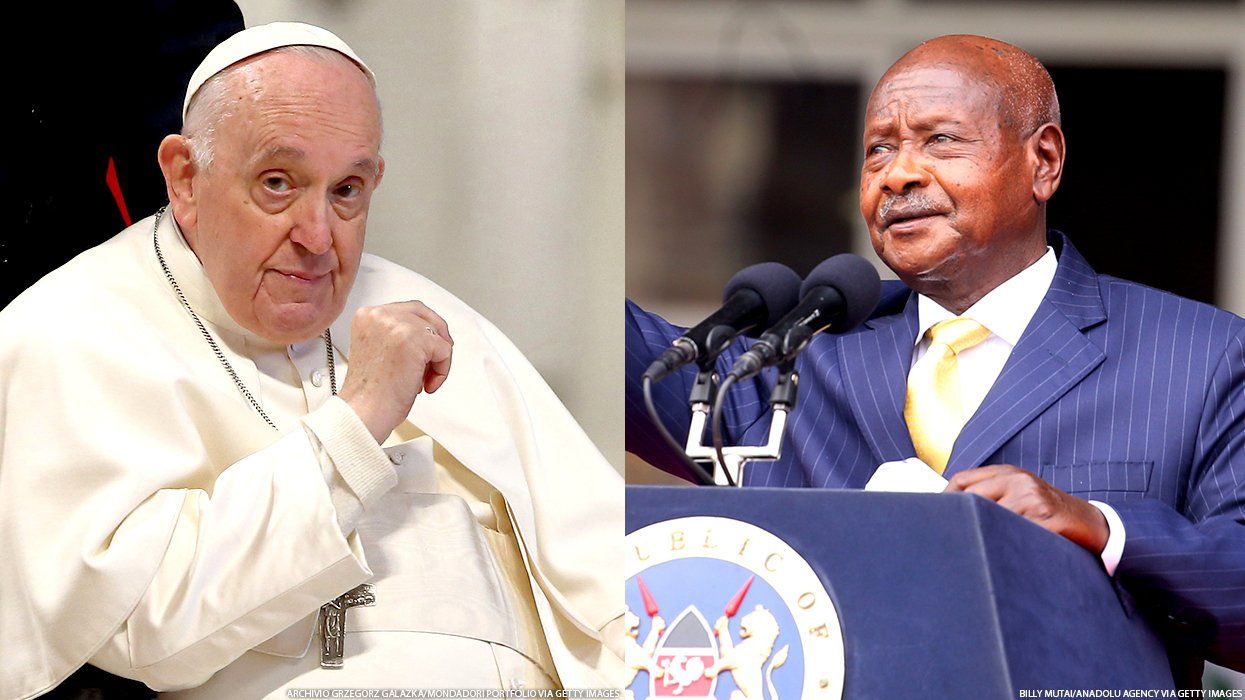Ugandan lawmakers have passed extreme legislation, that includes the death penalty for repeat offenders, requires people to report anyone suspected of being gay or lesbian to the authorities, and could send activists to jail for 20 years. President Yoweri Museveni has 30 days to sign the bill for it to become law.
This is an apt moment to recall Pope Francis’s recent statements that laws criminalizing homosexuality are “unjust,” and that the Catholic Church can and should oppose them. Recognizing that certain Catholic bishops support such laws, the Pope remarked on the need for change within the Church and emphasized the importance of recognizing the dignity of all human beings. Anglican and Presbyterian church leaders joined the Pope in condemning criminal penalties for same-sex conduct.
Yet, religious leaders in Uganda, including the Anglican Archbishop, Rt. Rev. Stephen Samuel Kaziimba, had been urging the passage of this insidious bill. The Ugandan bill expands the existing criminalization of same-sex conduct to create a legal framework for systematic persecution and social exclusion based on sexual orientation and gender identity. Ugandan Catholic clergy used the occasion of Ash Wednesday, a Christian ritual of repentance, to condemn homosexuality in the strongest terms, adding to a chorus of denunciation by public figures that has stoked a moral panic in Uganda.
Bishop Sanctus Lino Wanok, depicted homosexuality as “not human” and akin to “death”, while Fr. Agabito Arinaitwe, a curate in the important parish of the Uganda Martyrs Catholic Shrine, which commemorates the execution of early Catholic converts who refused the sexual advances of Mwanga II, the 19th century Buganda king, said, with reference to homosexuality: “It’s time we turn away from our evil deeds and turn back to the Lord.”
Since the passage of the bill, Catholic leaders have undertaken to discuss the content of the bill and announce ‘the position of the Catholic Church in Uganda.
“Being homosexual isn't a crime," Pope Francis said. “We are all children of God, and God loves us as we are and for the strength that each of us fights for our dignity." He subsequently added that “Criminalizing people with homosexual tendencies is an injustice.” And that “Criminalization is a serious problem.” These are welcome statements from Pope Francis, renewing emphasis on existing Catholic Church doctrine that condemns violence, criminal penalties, and unjust discrimination based on sexual orientation.
Similarly, 10 years ago, South African Anglican Archbishop Thabo Makgoba called on everyone to “Respect the gift of difference,” adding, “I cannot allow people to be discriminated, and I cannot allow people to meet violence, just on the basis of their sexual orientation”.
For nearly a decade, Human Rights Watch has called on the Vatican to condemn government practices that condone violence and unjust discrimination, including the criminalization of same-sex conduct.
As we wrote to the Pope in 2014, while human rights principles and Church teaching are not always aligned when it comes to issues of gender and sexuality, we can agree that “respect for human dignity requires concrete actions to create an environment in which people in sexual and gender minorities can live peacefully as full members of society.”
As we have repeatedly documented, laws criminalizing homosexuality are not only unjust, they foment violence and abuse against LGBT people, as examples in Jamaica, Cameroon, Uganda, and Uzbekistan vividly testify.
Sadly, as the Pope acknowledges, Catholic leaders have often failed to condemn anti-LGBT laws, at times explicitly or implicitly endorsing them. In Zambia, for example, Catholic bishops recently reiterated that “[p]racticing homosexuality constitutes a criminal offence . . . and the law has to be respected.” Singapore’s archbishop initially opposed the recent repeal of a colonial-era anti-sodomy law, and only after the law was repealed stated the local church did not “seek to criminalise the LGBT [but to prevent so-called] reverse discrimination [against Catholics].” Some 67 countries still criminalize same-sex sexual activity, and a number of them can or do impose the death penalty.
Yet despite the reticence of local leaders, there is an opportunity for change. In October of this year, Catholic leaders will converge in the Vatican for a meeting of the Synod of Bishops. This meeting marks the culmination of a two-year consultation process with Catholic clergy and laity from around the world. Encouragingly, the Vatican’s working document for the Synod acknowledges the need for “a more meaningful dialogue and a more welcoming space” for those marginalized by the Church, including LGBT people.
Religious leaders should speak out unequivocally against a bill that metes out lengthy jail terms, or even death, for consensual same-sex relations, curtails any advocacy on the rights of LGBT people, and requires people to report anyone thought to be gay or lesbian to the police. Pope Francis himself could fall foul of this odious law.
Graeme Reid is the LGBT rights director at Human Rights Watch.
Views expressed in The Advocate’s opinion articles are those of the writers and do not necessarily represent the views of The Advocate or our parent company, equalpride.




































































Charlie Kirk DID say stoning gay people was the 'perfect law' — and these other heinous quotes